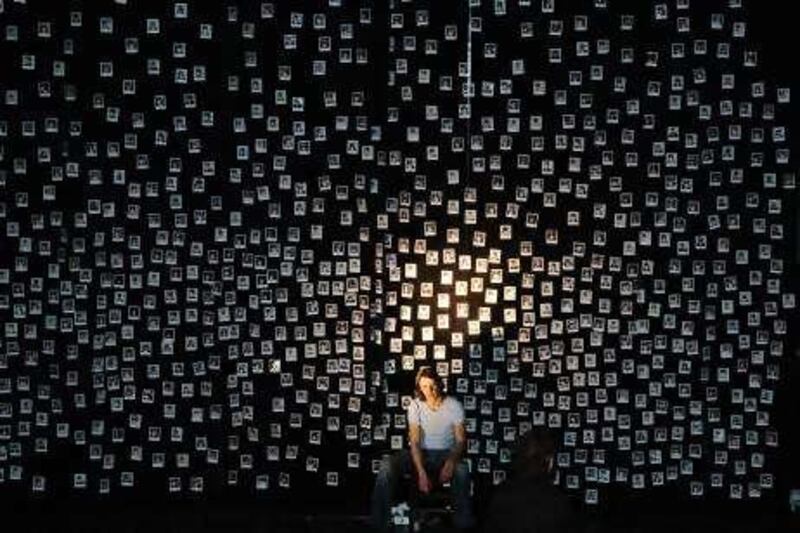I'm blindfolded, my hands are tied and I'm sitting in a wheelchair listening to gentle rattling sounds near my head. The next thing I'm aware of is someone's breath on my cheek, and with a start I realise an actor's face must be millimetres away from my own. The play - more of an immersive experience than a story - ran for two weeks earlier this month in south London. It's an emotional roller-coaster of a piece, and when it's over, it takes me a few minutes to pull myself together enough to navigate my way towards the next scheduled piece of theatre.
The Smile Off Your Face, which won a Fringe First at Edinburgh in 2007, isn't the only intensely personal adventure to be had at the Battersea Arts Centre (BAC) festival. The sprawling venue has been turned into dozens of different performance spaces where one audience member at a time will be sung to, dressed up, kidnapped or charmed, depending on their programme. The pieces vary in length from a minute and a half to over half an hour, and visitors can pick from 30 different experiences on offer. In one particularly challenging piece, Etiquette, two audience members at a time don headphones that feed them dialogue and stage directions: they become both actors and spectators.
The One-on-One Festival took two years to put together, but it's got its finger on a very contemporary pulse. Participatory theatre has been steadily growing in popularity over the last five years in London, and this year, it's really exploded. The funhouse-style immersive theatre piece You Me Bum Bum Train, with its rotating cast of 200 performers, was the Barbican's fastest-selling show this year. Recently, the dusk-'til-dawn promenade performance Hotel Medea kicked off at Greenwich pier, where punters were loaded into boats for dancing, music and actors playing Ancient Greek tragic heroes.
"Artists are embracing the possibilities involved in having a more creative and engaged audience," says David Jubb, one of the BAC's two artistic directors, who helped put together the One-on-One Festival. "Audiences are getting used to this kind of interaction through more democratised forms like the internet, where people are used to a level of authorship." He's excited about the way that the form guarantees freshness: "When an artist looks into an audience member's eyes and vice-versa, in that exchange, anything can happen."
Alexander Devriendt is one of the performers in The Smile Off Your Face and the founder and artistic director of Ontoerend Goed. "We see theatre as a unique medium with unique abilities," he says. "The live 'here and now' experience: movies don't have that." Rather than setting out to make a piece for one audience member at a time, his company starts from an idea, and then works out the best way to express it. But, he adds, "live confrontation is central to every idea I have. A piece of one-on-one theatre is impossible to do in any other medium, but I think that about every play I make."
Carving out a niche that is completely separate from cinema may be one motivation behind artists creating increasingly immersive, intimate performances, but Kneehigh artistic director Emma Rice suggests another influence: computer games. "Theatre has to keep reinventing itself," she says, "because our interaction with stories has changed massively just over the last 20 years. Anybody who's been brought up playing video games knows that they can interact, they can change the end, they can be present, and yet we still expect people to come and sit in a seat and see something that's been completely signed and sealed. What we expect from our entertainment is changing."
In the specially commissioned piece she has devised for the One-on-One Festival, a nurse performs a series of tests and then chooses a suitable story for the audience member to listen to with his or her eyes closed. Entitled Wonder Nurse, the experience is charming, playful and funny. "It's a very simple idea that's absolutely inspired by the form," she says, "and the show's delightful. It's like having a mini bit of Kneehigh just for you."
While Wonder Nurse and the third performance Onteorend Goed will bring to the One-on-One Festival, A Game of You, are brand new, the Birmingham theatre company Stan's Cafe will be performing a much older piece. Their four-minute-long It's Your Film involves the viewer sitting in a small photo booth-like box, where they can watch actors performing through a window. Both performers seem to be searching for someone, and towards the end it becomes clear that the viewer is the missing part of the puzzle. According to director James Yarker, "The play attempts as much as it can to look like a film, until the moment it makes eye contact with you and lets you see yourself watching it, and says you're really here, now and we're really here, now, and we're both together."
It was first devised in 1998, when, Yarker said, "we hadn't come across any shows that were for one person at a time" and is considered to be one of the frontrunners in the new wave of ultra-intimate theatre. Performance artists and experimental practitioners, of course, have come up with similar formats at various times and places around the globe - in David Jubb's opinion, you could trace one-on-one theatre back to crystal ball booths at funfairs, but there's certainly a lot more of it around at the moment than when It's Your Film was first performed, and it's exciting stuff. "I think it's popular now because it's a new tool to play with," Yarker suggests.
"The territory hasn't been claimed yet, it's up for grabs. You can charge around, exploring like mad."










